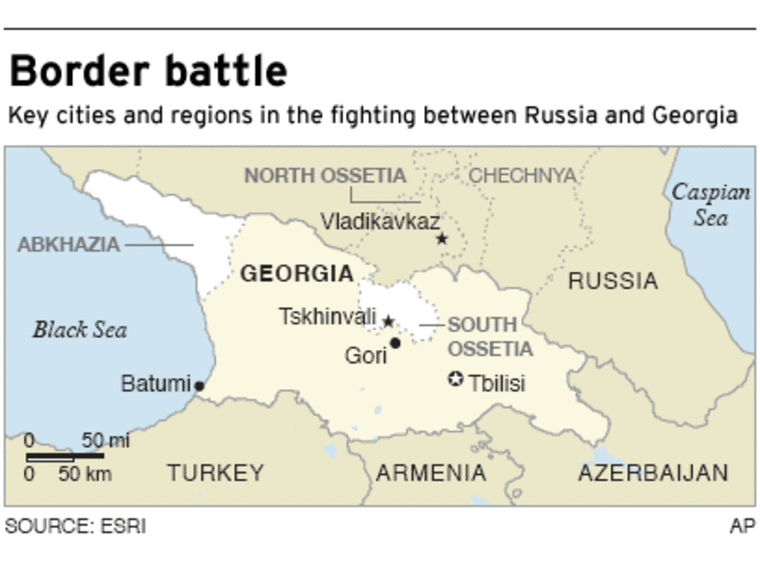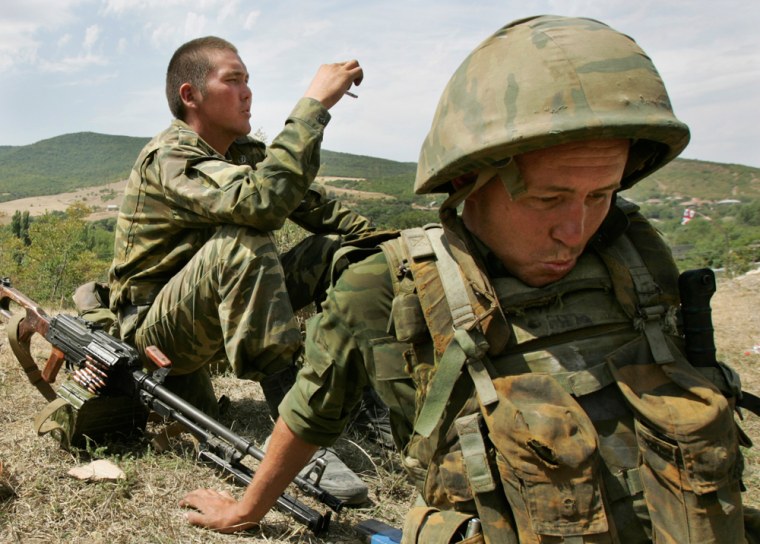Russian forces built ramparts of earth around tanks and posted sentries on a hill in central Georgia on Saturday, seemingly digging in despite Western pressure for Moscow to withdraw its troops under a cease-fire deal signed by Russia's president.
The United States and France said Russia appeared to be defying the truce already. Russian troops still controlled two Georgian cities Saturday, cities well outside the breakaway provinces where earlier fighting was focused.
"From my point of view — and I am in contact with the French — the Russians are perhaps already not honoring their word," U.S. Secretary of State Condoleezza Rice said.
U.S. President Bush sternly warned Russia that it cannot lay claim to two separatist regions in U.S.-backed Georgia even though their sympathies lie with Moscow. "There is no room for debate on this matter," Bush told reporters at his Texas ranch.
But Georgia's Foreign Ministry accused Russian army units and separatist fighters in one of the regions, Abkhazia, of taking over 13 villages and the Inguri hydropower plant Saturday, shifting the border of the Black sea province toward the Inguri River.
Abkhaz officials could not immediately be reached for comment on the late-night claim, and there was no information on whether the seizure involved violence.
The villages and plant are in a U.N.-established buffer zone on Abkhazia's edge, and it appeared that the separatists were bolstering their control over the zone after Russian-backed fighters forced Georgians out of their last stronghold in Abkhazia earlier this week.
The tense peace pact in Georgia, a U.S. ally that has emerged as a proxy for conflict between an emboldened Russia and the West, calls for both Russian and Georgian forces to pull back to positions they held before fighting erupted Aug. 7 in the other breakaway province, South Ossetia in central Georgia.
But freshly dug positions of Russian armor in the town of Igoeti, about 30 miles west of the capital Tbilisi, showed that Russia was observing the truce at the pace and scope of its choosing.
Foxholes, tanks and troops
Earlier, Russian forces had dug shallow foxholes in the middle of Igoeti and parked tanks, one flying a Russian flag, along the road. In the afternoon, they withdrew from those positions to the town's western outskirts. There, they set up defensive positions with tank cannons pointed back toward Georgian-held territory, where police and soldiers milled about, awaiting the next move of their stronger adversary.
Russian troops were deployed in large numbers west of Igoeti, in and around the strategic city of Gori, which endured an intense Russian bombardment during the fighting that began when Georgia attacked South Ossetia.
Military vehicles on the side of the road were camouflaged with branches and a couple of soldiers slept on stretchers in the shade of the hulking machines.
Near Igoeti, a Georgian journalist photographed a Russian armored personnel carrier that had broken down and was set afire by its occupants, who preferred to destroy it rather than let it fall into the hands of the Georgians.
Russian troops effectively control the main artery running through the western half of Georgia, because they surround the central city of Gori and the city and air base of Senaki in the west. Both cities sit on the main east-west highway that slices through two Georgian mountain ranges.
Blocking Black Sea access
Controlling Senaki, which sits on a key intersection, also means the Russians are blocking access to the Black Sea port city of Poti and the road north to another breakaway region, Abkhazia. AP reporters have seen Russian troops there for days but noted a growing contingent Saturday, and artillery guns and tanks pointed out from the city, which they appear to be using as a base for their sorties elsewhere in western Georgia.
An Associated Press Television News team saw Russian soldiers pulling out of the Black Sea port of Poti after sinking Georgian naval vessels and ransacking the port. A picture of Georgian President Mikhail Saakashvili in the looted office of the navy and coast guard had been vandalized, with the face scratched out.
"They have robbed the military base and taken almost everything, and they have burned or sunk the stuff they could not carry," port worker Zurab Simonia said.
Russian forces have been moving in and out of Poti in recent days.
Russian Foreign Minister Sergey Lavrov suggested there would be no immediate broader withdrawal and said that Russia would strengthen its peacekeeping contingent in South Ossetia.
Moscow signs deal
Lavrov confirmed that Russian President Dmitry Medvedev signed the cease-fire deal and ordered its implementation, but he said Russian troops would not withdraw until Moscow is satisfied that security measures it forces are allowed to take under the agreement are effective.
"As these additional security measures are taken, the units of the Russian armed forces that were sent into the zone of the South Ossetian conflict ... will be withdrawn," he said.
Asked how much time it would take, he responded: "As much as is needed."
French President Nicolas Sarkozy, who brokered the cease-fire agreement, said Saturday that the truce explicitly bars Russian troops from Gori or "any major urban area" of Georgia. Sarkozy's office released a letter Saturday explaining that the "additional security measures" do not apply beyond the "immediate proximity of South Ossetia."
His office also noted that the security measures "should in no way limit or put in danger freedom of movement and travel along the road and rail axes of Georgia."

Lavrov accused Georgia of undermining security, citing the Russian military's claim that it had averted an attack on a highway tunnel by stopping a car laden with grenade launchers and ammunition.
"We are constantly encountering problems from the Georgian side, and everything will depend on how effectively and quickly these problems are resolved," he said.
Georgia, meanwhile, claimed that Russian forces blew up a railroad bridge Saturday. Russia denied it.
The rival claims underscored the fragility of the cease-fire. Lavrov also said the deal Saakashvili signed Friday differed from the one with Medvedev's signature, with Saakashvili's version lacking an introductory preamble. While that difference may appear to be a technicality, it could be one either side could cite if it wants to abandon the deal.
The conflict erupted after Georgia launched a massive barrage to try to take control of South Ossetia. The Russian army quickly overwhelmed its neighbor's forces and drove deep into Georgia, raising fears that it was planning on a long-term occupation.
Even if Russian forces do withdraw from the rest of Georgia, Moscow appears likely to maintain strong control over South Ossetia. Lavrov said Thursday that Georgia can "forget about" South Ossetia and Abkhazia, which broke from Georgian government control in early 1990s wars, and their future status is shaping up as a potentially explosive source of tension.
In Texas, Bush said, "A major issue is Russia's contention that the regions of South Ossetia and Abkhazia may not be a part of Georgia's future. These regions are a part of Georgia and the international community has repeatedly made clear that they will remain so."
Russia has long viewed growing U.S. influence in Georgia as an encroachment on its traditional sphere of influence and a threat to its clout. The fighting came amid U.S. efforts to close a deal on a missile shield based in former Soviet satellites in Europe, an issue already damaging ties with its former Cold War foe.
